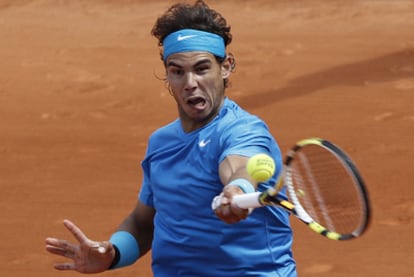Isner serves up Nadal warning
US player takes two sets off reigning champion in Roland Garros opener
Rafael Nadal battled through an anything but customary first-round match at the French Open on Tuesday against towering world number 39 John Isner, eventually coming out on top 6-4, 6-7, 6-7, 6-2, 6-4 in a minute over four hours.
The American with the thunderous serve is no stranger to tardy matches and already assured a place in the record books after participating in the longest encounter in tennis history at last year's Wimbledon; an 11-hour 6-4, 3-6, 6-7, 7-6, 70-68 victory over Nicolas Mahut. But on the Philippe Chatrier grandstand at Roland Garros, Isner came close to pulling off a victory that, at least on the Paris clay, is as close to impossible as the sport of tennis can muster.
"It's always a very, very close match with John," Nadal said on court. "I was there, I fought all the time. In the tiebreaks I was probably too nervous."
Never has Nadal been beaten in the first round at the French Open. In fact, he has been beaten just once at the event, at the hands of Robin Söderling in the fourth round in 2009. The five-times champion had never even dropped a set before the third round, and he had relinquished just 10 in six Roland Garros tournaments before Isner and his 230/kmph serve loped into view on the other side of the net.
Even arguably the greatest all-court player in history, Roger Federer, has only relieved the Spaniard of three sets overfour matches at the season's second Grand Slam.
Nadal, who raised his game in the fourth and fifth sets to stem the tide after Isner had claimed the previous two in tie-breaks, faces a new kind of challenge this year. In the history of the game there have been few less appealing draws than Nadal in the first round at any clay court tournament but Novak Djokovic's double-triumph over the world number one in the Madrid and Rome Masters Series finals seems to have altered the way in which players approach their date with destruction.
The long walk onto the red dirt with Nadal awaiting is a funereal occasion and his opponents have previously seemed resigned to march to the executioner's drum. But that veneer of invincibility Nadal has built up at Roland Garros since 2005 is being peeled away like the dance of the seven veils. In Rome world number 148 Pablo Lorenzi gave a hint of things to come as he blasted his way to a one-set advantage in Nadal's opening match.
Djokovic's exceptional form- the Serb has won all 37 matches he has played in 2011- has provided the rest of the Tour with a glimmer of hope against the king of clay. It promises to be a long tournament for Nadal, who has suddenly become not just the man to beat, but one that can be beaten.
It is likely that Isner, who forced Nadal into just the 18th five-set match of his career and his first in Paris, will not be last to do so this year at the French Open.
Also on Tuesday, Nicolás Almagro, who was viewed as a potential dark horse in Paris after his Nice triumph and a gradual rise up the ranking over the past year to world number 12, was defeated in the first round by Lukasz Kubot, a player ranked 111 places below the Spaniard. Despite losing the first two sets, Kubot fought back to win 3-6, 2-6, 7-6, 7-6, 6-4 in a match that Almagro drily termed "crap."
"It's my fault," Almagro said. "I didn't know how to win. It doesn't need to be said that it's a big blow."
Daniel Gimeno-Traver joined Almagro on the early flight out of Paris, falling to Robin Haase in straight sets while Pablo Andújar recorded the same result against Santiago Giraldo to set up a second round match against Nadal.
Fernando Verdasco also reached the second round late on Tuesday with a four-set victory over Juan Mónaco. Verdasco, the world number 15, controlled the first two sets but dropped the third before rallying to a 6-2 7-5 4-6 6-4 victory.

Tu suscripción se está usando en otro dispositivo
¿Quieres añadir otro usuario a tu suscripción?
Si continúas leyendo en este dispositivo, no se podrá leer en el otro.
FlechaTu suscripción se está usando en otro dispositivo y solo puedes acceder a EL PAÍS desde un dispositivo a la vez.
Si quieres compartir tu cuenta, cambia tu suscripción a la modalidad Premium, así podrás añadir otro usuario. Cada uno accederá con su propia cuenta de email, lo que os permitirá personalizar vuestra experiencia en EL PAÍS.
¿Tienes una suscripción de empresa? Accede aquí para contratar más cuentas.
En el caso de no saber quién está usando tu cuenta, te recomendamos cambiar tu contraseña aquí.
Si decides continuar compartiendo tu cuenta, este mensaje se mostrará en tu dispositivo y en el de la otra persona que está usando tu cuenta de forma indefinida, afectando a tu experiencia de lectura. Puedes consultar aquí los términos y condiciones de la suscripción digital.








































